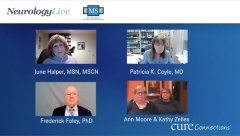
OPTIMUM Trial for Multiple Sclerosis

Episodes in this series

The phase 3 OPTIMUM head-to-head trial of ponesimod compared to terifunomide showed a positive impact on multiple sclerosis fatigue.
June Halper, MSN, MSCN: There were other studies presented over at ACTRIMS-ECTRIMS virtually. And there was another study called OPTIMUM which looked at ponesimod and teriflunomide. I’m wondering if there was anything that we need to think about in terms of future treatments.
Patricia K. Coyle, MD: This was a very interesting phase 3 trial. Ponesimod is a second-generation S1P [sphingosine 1-phosphate] receptor modulator. It’s a second-generation oral fingolimod. It hits S1P [sphingosine 1-phosphate] receptor 1 principally. They’re trying to get away from the cardiac side effects and the first dose monitoring. It went against oral teriflunomide. It was the first randomized prospective study that looked at two oral agents. It was a 108-week study. The primary outcome was annualized relapse rate. That was significantly better with ponesimod than teriflunomide.
But the people running the study did something that was pretty surprising. They added, as a secondary outcome, a fatigue measure. Now, that’s unusual. You really don’t see that. They used a new more extensive validated patient-reported outcome for fatigue— the Fatigue Symptom and Impact Questionnaire in Relapsing MS. What they found was that the fatigue as measured by this fairly extensive self-reported outcome remained basically at the exact same level throughout the two years of the study in the ponesimod arm, whereas it significantly increased over time in the teriflunomide arm. There was significantly less change, less development of worsening fatigue with the ponesimod versus the teriflunomide. That was interesting. It was gutsy. It was a secondary outcome. They happened to have won in that regard. It will be very interesting. Ponesimod is in front of the FDA right now. They’ll probably make a decision in the first of order of this upcoming year, and it will be very interesting to see if ponesimod gets approved, what people think about this impact potentially on fatigue.
June Halper, MSN, MSCN: It’s interesting because it’s probably one of the first disease-modifying therapies that had an impact. As you said earlier, the interferon betas made people more tired of the side effects, should it be approved? I guess it may fit in to your treatment paradigm as far as you come across somebody with significant fatigue and relapsing MS [multiple sclerosis].
Patricia K. Coyle, MD: It will certainly be something to consider. It’s going to be competitive in the S1P [sphingosine 1-phosphate] receptor modulator group— fingolimod, siponimod, ozanimod, and presumably this may be added, ponesimod, absolutely.
June Halper, MSN, MSCN: Well, you’ve got one more drug to think about, my goodness. We’ll need a chart like the chart for atomic weights.
Patricia K. Coyle, MD: That’s why you need somebody knowledgeable about MS [multiple sclerosis]. I mean, if you’re going to diagnose and treat patients, you need to be familiar with all the treatments.
June Halper, MSN, MSCN: Dr. Foley, in listening to all this, any comments about patients’ quality of life? Do you have any feelings about this particular study as it’s starting to evolve? Are you hopeful?
Frederick Foley, PhD: Just from a clinical standpoint, I’ve seen the impact that the disease-modifying therapies have had on patients’ quality of life. Any time you can slow the progression to disability, that kind of has a counterpart in a quality of life. There are still many challenges of quality of life in MS [multiple sclerosis]. Every study in quality of life in MS show that MS patients have significantly lower quality of life than people without MS [multiple sclerosis]. And that quality of life tends to become lower over time as disability progresses. The challenges that people face to managing their employment status, managing their relationships, managing the MS [multiple sclerosis] symptoms. As Dr. Coyle was saying before, fatigue is a devastating symptom and the primary cause of unemployment in MS [multiple sclerosis], the frontal motor problems. All of these things affect the quality of life that patients and their family members have to continue to struggle with.
June Halper, MSN, MSCN: I want to thank you all for watching and joining us at this NeurologyLive® Cure Connections®. If you enjoyed this program, please subscribe to the e-newsletter to receive upcoming information about other programs. I’d like to thank you all for the time and I thank you all for this wonderful opportunity and hope to see you all again.
Newsletter
Keep your finger on the pulse of neurology—subscribe to NeurologyLive for expert interviews, new data, and breakthrough treatment updates.






















